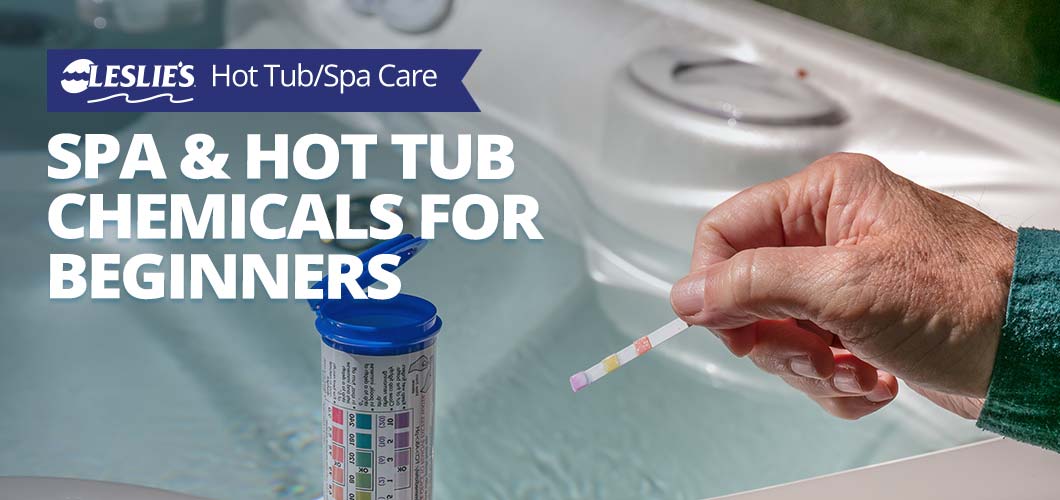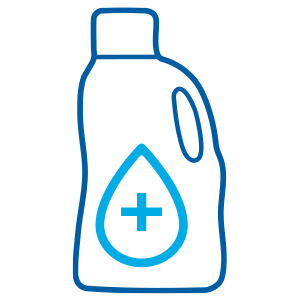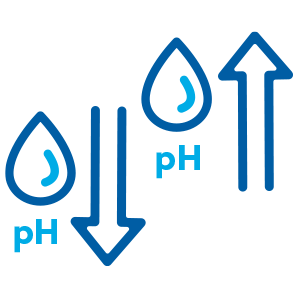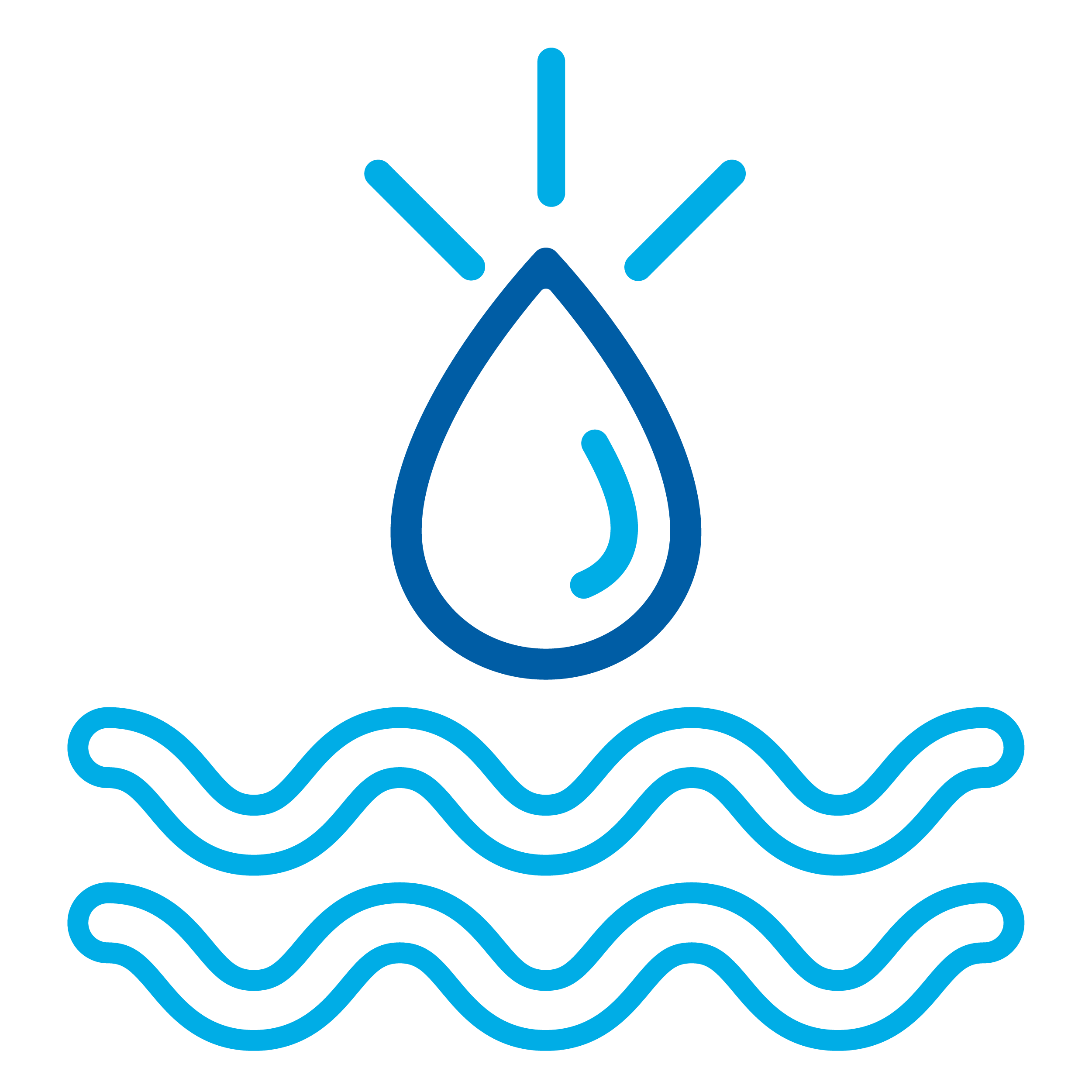
Spa & Hot Tub Chemicals for Beginners
In today's post, we follow up on our popular Beginner's Guide to Spa & Hot Tub Care post, and get more granular with our newest installment: an in-depth look into the basics of spa and hot tub chemicals.
Although there's currently no such thing as a "Dummies" branded guide book for hot tub chemicals, it doesn't take much for a beginner to learn more about the chemicals needed for a hot tub. In this post, we'll explore some basic hot water chemistry topics that might confuse a novice hot tub owner.
In this blog post, we'll go over:

What types of chemicals are needed for a hot tub?

How do you treat common water problems?

What are alternative sanitizer options for hot tubs?
Types of Hot Tub Chemicals
There are so many different types and brands of hot tub chemicals on the market. No wonder it can be so confusing for new hot tub owners! To help make it easier, we've broken this section down into six categories of spa and hot tub chemicals. Each section includes a short description of what they are, what purpose they serve, and when they're used.
Balancers
Spa chemistry is not overly complicated. When we speak about water balance and balancing chemicals, some people's eyes glaze over. But it's really quite simple! Balanced water simply means that your spa chemical readings are all within the ideal ranges. Specifically, we want chemistry ranges for pH at 7.4-7.6, Total Alkalinity at 80-120 ppm, and Calcium Hardness at 150-250 ppm. When all three are within range, your water is said to be balanced.
If you really want to geek out and determine a more accurate level of water balance at home, you can use a Saturation Index calculator. You can also bring a water sample to your local Leslie's store for a free AccuBlue® water test, which gives you a precise measurement of all aspects of hot tub chemistry.
Of all spa balancing chemicals, pH reducer is probably the most commonly used. This is because pH and Total Alkalinity tend to rise in spa water, and a pH decreaser effectively reduces both. If spa water is soft or you're noticing low hardness levels, raise it with a Calcium Hardness booster. For a low pH and/or Total Alkalinity test, use a pH increaser and/or alkalinity increaser to raise the levels.
Clarifiers
If your spa water is cloudy and lacks clarity or sparkle, it may be time for a new spa filter cartridge. If the filter is fine, there may be issues with water sanitation. Clarifiers are polymers that have a positive charge and attach themselves to negatively charged particles floating around the hot tub. What starts as a microscopic particle eventually ends up as a large clump of hundreds of particles, which is large enough to get trapped in the filter.
That said, clarifier chemicals are used when spa filters need a little help, or when water conditions turn poor. Be careful not to overdose with clarifier, however. Otherwise, it may have the opposite effect and gum up your spa filter. If your hot tub water is always clear and sparkling, you may have no need to use a clarifier chemical.
Cleaners
In this category of spa chemicals, we have all kinds of cleaning chemicals for your spa or hot tub. There's cleaning solutions for filter cartridges, cleaner and conditioner for your spa cover, cleaning and polishing products for your spa shell, as well as products such as Jet Clean to purge biofilm buildup from your plumbing lines.
Generally speaking, you should NEVER use household chemicals to clean your spa or accessory items. The only exception to this rule is using mild soap and water for cleaning, but only if you rinse it off thoroughly afterwards to prevent the spa from foaming.
Sanitizers
A sanitizer is the everyday chemical used to kill pathogens like bacteria, fungus, mold, viruses, etc. Most spa owners will use either bromine or chlorine as the main sanitizer. Granular chlorine is administered by hand when chlorine is preferred. Or you can use bromine tablets instead, which is usually the easiest route. You can also use sodium bromide (a.k.a. bromine booster) and then a small amount of spa shock (either chlorine or chlorine-free shock) to activate the bromide salts into bromine.
Never use chlorine tablets in a spa, as they're formulated for use in swimming pools. In addition, they are often too strong for spas. Using pool chlorine tablets in a hot tub or spa can damage surfaces and equipment.
You must keep an active level of sanitizer at all times in spas and hot tubs. This is about 2.0-4.0 ppm bromine or 1.0-3.0 ppm chlorine. If the level drops below the recommended range or near zero, then pathogens, algae and other contaminants will begin to grow and multiply quickly. Yes, this is true even in hot water and even when the spa is covered tightly.
Shocks
Spa shock is also a type of sanitizer, but it's used differently than normal spa sanitizers. Chlorine and non-chlorine (MPS) spa shocks are quick dissolving and fast acting. Shock is used to kill anything that your daily sanitizer has missed. It can also be used to supplement your daily sanitizer during times of heavy use, such as after a four-person soak in the spa.
If using bromine as your primary sanitizer, shock activates bromide salts and converts them into bromine. If you use bromine tablets, this isn't necessary. But shock is still useful for giving the spa a sanitizer boost after heavy use, or as a regular weekly or biweekly shock treatment just to be sure the water is sanitary.
Another use of spa shock is to kill algae, remove foul odors, correct water discoloration or poor clarity, or resolve a variety of water issues from many causes. For best results, always check water balance and adjust as necessary before shocking a spa. Follow label instructions for treatment info and dosage to match your spa size in gallons/liters.
Specialty
Specialty spa chemicals are chemicals that don't fit neatly into the other categories. Chemicals like Spa Anti-Foam (cuts down surface foam), Metal Gon/Defender (keeps metals and dissolved solids in solution), enzymes (dissolves organic debris and oils naturally), algaecides (prevents algae growth in hot water spas) or Leak Seal (seals up small leaks) all fit into this catch-all category.
You may have a need for these chemicals at some point to resolve water-related issues in your spa. Then again, you may be lucky and only rarely need these types of chemicals.
Some people also group aromatherapy products into the specialty chemicals category. However, these are not for correcting a water balance or hot tub issue. Aromatherapy is for YOUR benefit, and can be used anytime you settle in for a soak.
How To Test Spa Chemistry
There are two ways to test spa and hot tub water at home – with test strips or a test kit. Unless you fancy yourself a chemist and prefer to use a titration test each time, I usually recommend multi-purpose test strips, which test for all the important stuff in just one to two minutes.
The secret to spa chemistry is not sold in a bottle, but it is pretty simple. Just test your spa water two or three times per week with regularity, and adjust in small increments as needed. You will begin to see patterns in the water's chemical fluctuations, especially if you keep a test log book. Even if you don't write down your readings or enter them into an app, over time you'll come to know your own hot tub's chemical personality.
BONUS TIP: If you ever have questions about your hot tub's water chemistry, or if you just want to have your water professionally tested, Leslie's can help. Bring a water sample to your local Leslie's store for a completely free, comprehensive AccuBlue® water test, which looks at 10 different aspects of water chemistry. You'll receive a detailed prescription with recommendations and step-by-step instructions to keep your water clean, clear, and sparkling.
How To Store Hot Tub Chemicals
When storing spa and hot tub chemicals, remember this:
- Keep out of reach of children.
- Store in cool, dry location at 50-80° F.
- Only open one container at a time.
- Tight lids keep out moisture, children, and prevent spills.
- Protect chemicals from mixing and contamination.
We've covered the topic before with some neat spa chemical storage ideas, but the general idea is to, number one, keep chemicals out of reach of children. Secondly, store spa chemicals in a cool, dry location, which usually means indoors. Temperatures of 50-75° F are best for prolonging chemical shelf life, helping to prevent gas formation or the hardening of granules.
Always open, use, and tightly close only one chemical at a time. Tight lids keep out moisture and small children, and also prevents spills, accidental mixing or contamination.
Here's a very important tip: never allow spa chemicals to mix with each other or become contaminated with any substance (dirt, leaves, etc.). A fire or explosion could result. Also, don't hang onto old spa chemicals; either use them up or dispose of them.
If you live in an earthquake zone, it's recommended to keep chemicals close to the ground, and not high on a shelf where they may fall and spill their contents. But we'll say it again – make sure children can't access these chemicals.
What Chemicals Do I Need for a Spa or Hot Tub?
So now that we've gone over the different types of chemicals available for your hot tub, it's time to gather your supplies. What do you actually need in your spa chemical storage cabinet? Here's a basic list of essential maintenance chemicals that every spa or hot tub owner must have:
- Spa Sanitizer – Usually Bromine or Chlorine
- pH Increaser and Decreaser
- Total Alkalinity Increaser
- Calcium Hardness Increaser
- Spa Shock – Either Chlorine or MPS
As a minimum, you'll need most of these spa chemicals. You'll likely use pH reducer more often than pH increaser. In most cases, you'll probably adjust the levels at least two or three times per month. Total Alkalinity and Calcium Hardness levels will usually hold steady for a month or more once it has been adjusted properly after a spa drain and refill. Spa shock will be needed for weekly use, in addition to a regular spa sanitizer for daily use.
You may also have a need for other chemicals from time to time, such as filter cleaners, metal removers or clarifiers. Many of our customers like the convenience of our Spa Maintenance Kits, which include sanitizer, shock, a bottle of Spa Perfect, Spa Stain & Scale, as well as test strips and a water test bottle. For more information about the different types of chemicals used, check out our blog post: What Chemicals Do I Need for a Hot Tub?
What are Natural Spa Chemicals?
For those that want to avoid the smell of chlorine or the slightly softer scent of bromine on your skin, you can try approaching hot tub water sanitation from a different angle. Instead of using only chlorine or bromine, you can also use spa mineral sticks, which use silver and/or copper ions to help purify the water. It can supplement your existing primary sanitizer to greatly reduce sanitizer demand.
You can also use ozone, injected into the plumbing from an ozonator. Both mineral and ozone systems, coupled with regular use of MPS (a non-chlorine oxidizer), some extra filtering, and careful attention to good water balance can allow you to operate most spas without the use of chlorine or bromine.
Also belonging in the natural chemical category are enzymes, which are natural scum eaters. These help to remove contaminants in the water by naturally digesting them. While not a 100% chlorine-free or bromine-free option, they do help to reduce sanitizer demand.
If you made it all the way to the end of this post, you are now a well-informed hot tub owner who knows how to properly balance and sanitize hot tub water! The great thing about maintaining water chemistry in a spa or hot tub is that if things go really bad, you can always replace the water and start fresh. Then again, you should be refreshing the water every three or four months, anyway. Remember to re-balance your water's chemistry, and rebuild the sanitizer levels or bromine bank after refilling.
If you ever have any questions about water chemistry or maintenance for your hot tub, we can help! You're not in this alone.